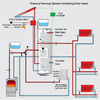Morning all,
Not sure this is the best place to post this but I'm trying to find some good sources of information on using renewable energy sources for heating systems.
I know that these systems have their critics but my thinking is that in the current climate, it would be wise to find a way to make renewable energy sources work.
My understanding is that the most popular systems currently on offer are the air and ground source heat pumps. There are a few new housing estates near to where I live that have these and I've noticed that after being lived in for 12-18 months, the properties go back on the market....which suggests to me that there's something not quite right with their design, be it the heating system or something else.
Here's what I've figured out so far about renewable resources:
I'd love to hear anything that users of these systems have to say, as I'd like to get it right if I pursue this option.
Thanks in advance
Jever
Not sure this is the best place to post this but I'm trying to find some good sources of information on using renewable energy sources for heating systems.
I know that these systems have their critics but my thinking is that in the current climate, it would be wise to find a way to make renewable energy sources work.
My understanding is that the most popular systems currently on offer are the air and ground source heat pumps. There are a few new housing estates near to where I live that have these and I've noticed that after being lived in for 12-18 months, the properties go back on the market....which suggests to me that there's something not quite right with their design, be it the heating system or something else.
Here's what I've figured out so far about renewable resources:
- they generate heat to a temperature that won't go as high as a standard fossil-fuel system. For this reason, traditional radiators aren't suffient to deliver the heat and under-floor systems are much better in this situation.
- the hot water doesn't get as hot as water heated by a fossil-fuel system, which can cause difficulties with washing up/having a hot shower.
I'd love to hear anything that users of these systems have to say, as I'd like to get it right if I pursue this option.
Thanks in advance
Jever






